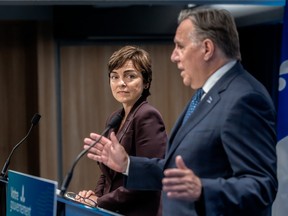‘We cannot open the doors without counting,’ said Quebec Immigration Minister Christine Fréchette
Article content
OTTAWA — With only two years experience in politics, Quebec Immigration Minister Christine Fréchette may be a political upstart, but she seems to be the spearhead of Canada’s immigration policy.
And now, with a mini cabinet shuffle likely on Thursday, François Legault could entrust her with yet another major file: the economy.
Since Fréchette took over as immigration minister in 2022, she has not been the most vocal or flamboyant minister but she has been trusted with one of her boss’s most cherished priorities. And again and again, Canada has followed Fréchette’s lead on immigration.
Advertisement 2
Article content
She was at the heart of a united front among the provinces on the asylum seekers file, she pushed Ottawa to impose a visa on Mexican nationals to enter the country and obtained a reimbursement of $750 million for the costs incurred in processing asylum seekers between 2021 and 2023.
The agreement, announced by Prime Minister Justin Trudeau and Premier François Legault in June, stung the premier of British Columbia, who denounced a double standard between Quebec and Western Canada.
“If this is a federal program to support newcomers, it needs to be in place nationally,” said Premier David Eby.
Yet since Legault became premier, the relationship between Quebec and the other provinces has rarely been as aligned on the issue.
In 2018, Legault wanted to limit the amount of immigrants Quebec takes in every year. Quebec has an accord with the feds that gives it more power than other provinces to select newcomers. The move, at the time, was criticized in the province, but also elsewhere in the country at a time when the Trudeau government had an open-arms approach to immigration.
Article content
Advertisement 3
Article content
In an interview with the National Post, Christine Fréchette underlined how her party was a “pioneer” of the idea that Canada welcomes too many immigrants and that it must review its thresholds.
“Two years ago, we were practically the only ones to hold this discourse, and the rest of Canada accused us of being too rigid and almost anti-immigration,” she said.
Recommended from Editorial
These days, the CAQ’s vision of immigration is gaining traction elsewhere. “We were clear-sighted in this matter. We were ahead of the parade. We were the ones who shed light on the debate with what it could generate as negative impacts for Quebec in terms of perception,” she added.
For instance, Conservatives Leader Pierre Poilievre recently said the country “needs to have a growth rate that is below the growth in housing, health care and employment.”
In the province, the Liberal Party of Quebec, which used to accuse the CAQ of blowing “on the coals of intolerance” because of its stance on immigration, has recently said it wanted more control because “under the CAQ, we saw an uncontrolled increase in new arrivals.”
Advertisement 4
Article content
Even the Liberals in Ottawa are adjusting. The Trudeau government is currently targeting about half a million new permanent residents a year, a sharp increase from about 300,000 a year when the Liberals came to power in 2015.
But Immigration Minister Marc Miller has already announced a plan to reduce the number of non-permanent immigrant by about 20 per cent over the next three years. He also wants to decrease the temporary resident population to about five per cent of Canada’s total. It currently stands at nearly seven per cent.
“Now that the rest of Canada is starting to endorse a vision that is close to that of Quebec, that we cannot open the doors without counting, I hope that this will positively change the image of Quebec,” Fréchette said.
CAQ officials even said that Fréchette’s work gave them the impression that she was Canada’s real minister of immigration.
“I think if that’s a compliment, then good for her,” said Miller in a phone call with the National Post. “I know we have a role to make things work, and I certainly have been accused, I think unfairly, of wanting to change the shape of Quebec. So maybe it’s a backwards insult to her.”
Advertisement 5
Article content
The feeling is far from unanimous in Quebec, as in Ottawa, but in both capitals, sources are quick to emphasize to what extent she is competent and in control of her files.
The vision of Quebec and how it sees the role of immigrants and immigration, in addition to its resistance towards its federal counterpart tees up “really difficult relationships,” according to Miller.
But he salutes Fréchette’s dedication in attending meetings with other provinces to make her point of view known and push for reforms.
“Whether (Fréchette is) calling the shots, (that) certainly isn’t the case,” he said.
In an interview, Fréchette said she doesn’t really feel like a federal minister, but she emphasized how effective her government has been.
She doesn’t want the federal job, saying she’s “happy that minister Miller is in charge” and that he has a lot to do in his portfolio.
However, it’s a portfolio that could quickly slip away from her. On Wednesday, Quebec’s “super minister” who oversees economic and energy issues, Pierre Fitzgibbon, confirmed he was stepping down after earlier reports sent the province into a political tizzy. “Fitz” is a key player in the plan to entice electric vehicle battery plants to Quebec that has been making headlines in the province for the past few years.
Advertisement 6
Article content
Fréchette’s name was soon circulating as a successor. A source told the National Post that she would gladly take charge of this economic file. Fréchette, who has a background in economics, is “ready for changes,” the source said.
“Be patient,” said Legault at a press conference when asked if Fréchette was on the list to succeed Fitzgibbon. He also confirmed that he would make a ministerial adjustment on Thursday in Quebec City.
National Post
atrepanier@postmedia.com
Get more deep-dive National Post political coverage and analysis in your inbox with the Political Hack newsletter, where Ottawa bureau chief Stuart Thomson and political analyst Tasha Kheiriddin get at what’s really going on behind the scenes on Parliament Hill every Wednesday and Friday, exclusively for subscribers. Sign up here.
Our website is the place for the latest breaking news, exclusive scoops, longreads and provocative commentary. Please bookmark nationalpost.com and sign up for our politics newsletter, First Reading, here.
Article content









